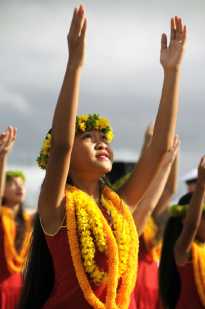Among many bad things done by the American missionaries was
the banning of Hula. I suppose it was
because of its pagan connotations, praising gods and telling epics and legends.
Maybe also because the women were topless, except for leis, and the swaying hips were thought lascivious by the puritanical
Yankees. Anyway, I remember the latter idea from my youth, when people would
wink and scoff at the notion that “it’s all in the hands.” The idea that there
was something venereal about Hula probably persisted in the minds of the young
sailors, who saw it when it was revived.
But it is anything but an erotic dance. The local parish
Hula troupe danced at Mass last Sunday. It was really uplifting, the story enacted
was our Lord’s encounter with the rich young man. Every gesture of hand and
foot and hip has a sign-language meaning, interpreting the words of the song
that is being sung (in this case a record). It is hard to convey how gentle,
beautiful, and gracious it is. A great many hymns and Biblical passages are now
choreographed this way.

The Parish Hula group is exclusively Kapuna (seniors over 60). Both sexes.The eldest is a lovely Japanese
lady of 85. All of them sway like palm-trees in the breeze and make the
complicated, flowing gestures together. St. Jude’s troupe is getting ready to
dance for the Bishop, when he visits on my last Sunday here. They also compete
regularly in Hilo and elsewhere. It is a very big deal here.
Hula is more strenuous than it appears. I went to practice
and joined in. I had to sit out after the first dance, though – winded and
tired already. One of the women said it was “much better than yoga.” She also
claimed that it had great spiritual benefit, which I can believe. In any case,
I can’t imagine anything more reverent or dignified.
There are secular Hulas, too – songs about love and fishing
and travelling and history. But in church, it’s all religious. Check out this link. They sing first and then start dancing.
Here's another one, in the traditional style, chanted without musical instruments. It was composed to cheer up Anglican Queen Emma, after the death of her child and husband.
Finally a secular Hula, with typical yodeling song and instruments.
No comments:
Post a Comment